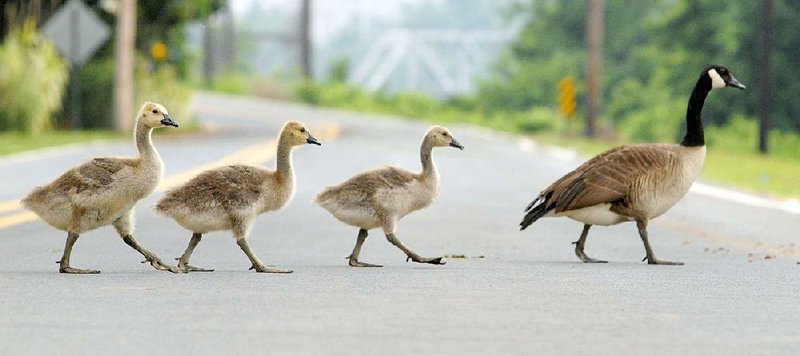Dear Otus,
I never got all that worked up over the fuss over the ivory-billed woodpecker allegedly being spotted in Arkansas, but these rare Canada geese that are visiting Greers Ferry Lake have us overrun with lookie-loos and Yankees. Any idea when the geese will be gone?
-- Ima Walken,
Fairfield Bay
Dear Ima Walken,
Yes indeed. It was wholly a pleasure to hear from you and a further pleasure to be able to encourage you to count your blessings for the economic boom that is descending on the region.
I'm told that this current influx of a rare subspecies of Canada geese is so unusual this far south that thousands of ornithologists and birders are flocking (pun intended) to north-central Arkansas and have already booked every motel room from Heber Springs down to Quitman, Clinton and all the way to Mountain View.
A quick check even found Little Rock area hotels with some overflow. There was a birder rally last weekend in North Little Rock's Riverfront Park highlighted by boisterous renditions of "O, Canada" and "Gens du Pays."
Experts at Audubon Arkansas say this anserine influx is one of those occasions birders call "spotting vagrants." It happens when, for whatever reason, birds wander far outside their normal range and allow regional bird watchers to see them for the first time.
In the case of your geese, some speculate it was the unusual one-two punch of Hurricane Harvey and Hurricane Irma that created a sort of Coriolis effect vortex out of Canada to pull these birds down the Ohio River valley into Arkansas. Combined with an unusual cold snap in their summering grounds, it was the perfect avian storm for Greers Ferry Lake.
Last week's warm late summer weather meant the birds are perfectly content to hang around, and there's no indication they are in any hurry to leave.
The hurricanes may have been responsible for more than just the geese.
In the past month, there has been an Old World species of egret seen along Maine's coastal wetlands, a Eurasian duck spotted in the Finger Lakes district of New York and a tyrant flycatcher in Indiana that has never been known to be in the United States.
So, what's the big deal about Canada geese? Aren't these the same birds that we see waddling by the score on the golf courses along the Arkansas River and in central Arkansas parks? They seem ubiquitous.
Indeed they are. That is, the usual Canada geese (Branta canadensis) are common, but the "vagrants" causing all the excitement are members of the rare subspecies Branta Quebecois oies -- French Canada geese.
The French Canada goose was one of the many species described by the Swedish botanist and zoologist Carl Linnaeus in his 18th-century work Systema Naturae. It also belongs to the Branta genus of geese, which contains species with largely dark gray plumage, distinguishing them from the light gray species of the Anser genus.
The subtle distinctions between the two species have led to centuries of debate among ornithologists.
Canada geese are known for their seasonal migrations to Southern states in V-shaped formations at an altitude of about 3,000 feet. Some geese return to the same nesting ground year after year.
The slightly smaller and more fastidious French Canada geese, however, spend the summers in central Quebec, dining on muskeg from the Akimiski Island Bird Sanctuary in James Bay eastward to the La Grande Riviere Reservoir. In winter, they migrate south only to the Montreal area along the St. Lawrence River and northeast to Jonquiere.
The odd goose might wander across into Maine or northern Vermont, but that would be unusual.
Unlike the familiar V-formation, French Canada geese fly in an accented capital Ú.
Canada geese are known for their rowdy vocalization, ranging from the cacophonous "a-honk" and the melodious "honk-a-lonk," to high-pitched cackling.
On the other hand, the much more polite French Canada geese have a soft call that sounds like "a-hem," "a-hem."
See for yourself. There will be a free party barge flotilla forming at 1 p.m. today at Heber Springs' Dam Site Recreation Area to visit the main geese cluster on Goat Island. Take binoculars and water.
Until next time, Kalaka reminds you that French Canada geese are not a source of foie gras because there is no gravage allowed in Quebec.
Disclaimer
Fayetteville-born Otus the Head Cat's award-winning column of
Z humorous fabrication X

Disclaimer: Fayetteville-born Otus the Head Cat's award-winning column of 👉 humorous fabrication 👈 appears every Saturday.
appears every Saturday. Email:
mstorey@arkansasonline.com
HomeStyle on 09/23/2017
